#unipolar world
Photo
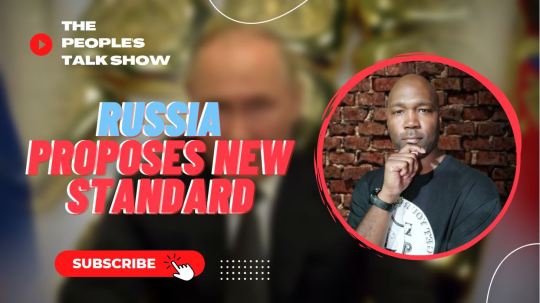
Now that #Russia proposes a new international standard for metals. Prices will be fixed either in the national #currencies of key member countries or using new monetary units used in international trade— i.e, the new #BRICS currency proposed by #Putin.
https://youtu.be/8cp-KW9H5Z8
0 notes
Text
the amount of people on here who think that discussing the immense power that the US and it's proxies like NATO and the EU have on the global stage & acknowledging that we spent the last few decades in a unipolar world that was very much beholden to the US is akin to "american/western centrism" and they think that makes themselves sound very intelligent and informed and progressive and anyone who tries to explain that they're wrong is just dismissed as a "tankie" or whatever. if you aren't going to actually read any of the books or articles people are posting then please just google the word "unipolarity" or "polarity" as a foreign relations term, it can't possibly make things worse for you than they already are
#the thing is even if you read the us foreign policy websites to learn what this term means theyre actually pretty clear about it#because they KNOW what theyre doing and they KNOW the unipolar world doesnt exist anymore and theyre furious about it#or listen to rania khalek dispatches she talks a lot about polarity thats a constant topic on her show#ignore what the twitter idiots are saying and actually read/listen to whats going on from the sources
43 notes
·
View notes
Video
youtube
The Ugly Truth of Pierre Teilhard de Chardin, Transhumanism and Canadian History talk with William Ramsey and Mathew Ehret (1 Oct 2022)
In this discussion between investigative journalist and podcast host William Ramsey and the Canadian Patriot Review's Matt Ehret, we discuss the continuous evolution of evil ideas from Hobbs to Malthus to Darwin to Galton and thence to Chardin's Transhumanism as well as the suppressed stories of some forgotten Canadian heroes who risked everything for the idea of a free and independent Canada.
#geopolitics#canada#pierre teihard de chardin#julian huxley#transhumanism#luciferianism#world government#oligarchy#multipolar world order#unipolar world order#aristocracy#belt and road initiative#united states#usa
4 notes
·
View notes
Text
Sometimes, people would rather talk about the actual and legitimate American/USA Evangelical Fundie conspiracy than acknowledge the very real agency of the Israeli government and a portion of the Israeli people in an ongoing genocide.
#even when the world was unipolar#other countries still had their own agency#tell me your imperialist without knowing your imperialist#refusing to acknowledge that the moral necessity of (trying) to answer difficult and/or nuanced questions applies to you#does not change reality#it just makes you (look?) complicit#anyway#donate to help Palestinians who are currently dealing with an ingoing genocide
0 notes
Text
Did the Ukraine Op (and bio labs?) start in 2005?
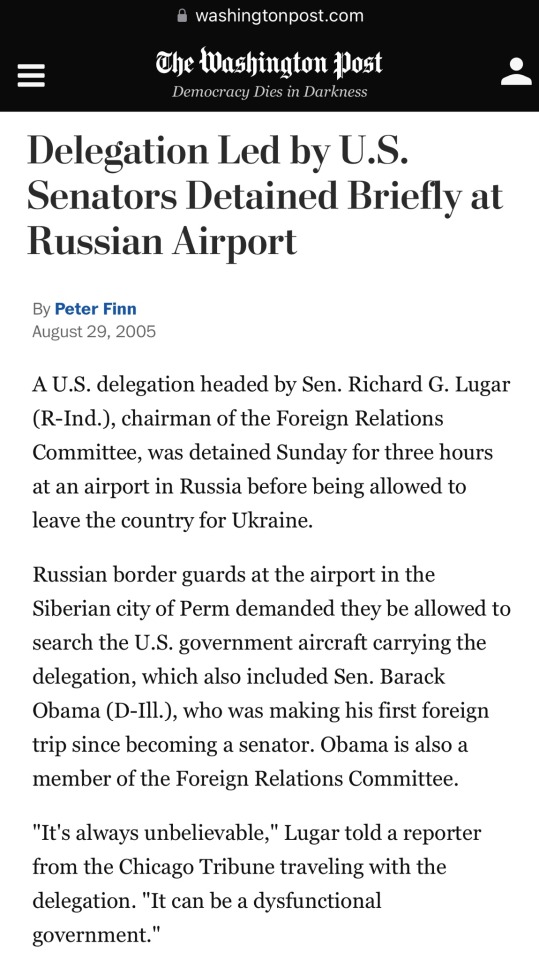
https://www.washingtonpost.com/archive/politics/2005/08/29/delegation-led-by-us-senators-detained-briefly-at-russian-airport/040051b6-6021-4ae0-9323-f78201dfd4a5/
:::
Commentary:
“This war started in 2005 when the Deep State, via then Senator Barack Obama, set up their foothold in Ukraine and began their plan to turn Ukraine into a bioweapons production zone.”
“The US claim it was to “destroy” the former Soviet Union’s chemical, biological, and physical weaponry left in Ukraine. 17 years later, we can see that the Deep State had much more in mind than just weapons disposal. Now it’s widely accepted that Ukraine is a US proxy, spearheaded by the ruling families of the DNC, and the biological activity there is no longer a conspiracy theory.”
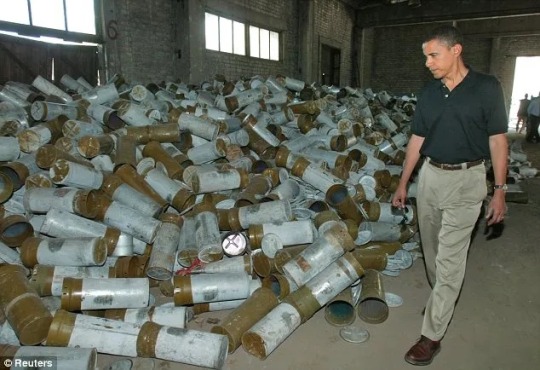
#neolibs#neocons#unipolar western dominance#new world order#ukraine#obama#empire of lies#biolabs#ground branch#sullivan and cromwell#oss
2 notes
·
View notes
Text
Is Unipolar World Order Coming to an End?
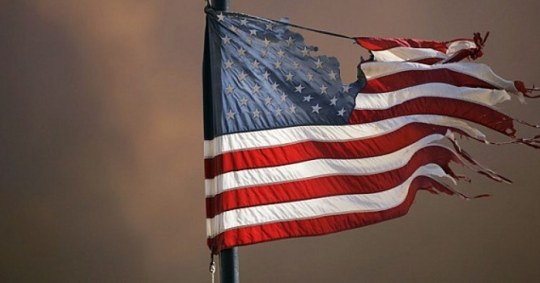
China as the Rising Super Power Is Unipolar World Order Coming to an End: We are seeing China get ever closer to joining the US as a world super power. We had a long unipolar moment that began after the ed of the Cold War and has lasted till now. China’s economic performance demonstrates that it is really close to becoming a super power. Its military modernization is relentless and we not be far off from the moment when the unipolar power comes to an end. China’s tremendous amount of capital that it can deploy in so many ways is something the US can not do. Similarly, the Chines BRI is such a milestone for the world order and international relations. This is something which China could do. More research articles
The current situation of Multipolarity
On one hand we have a level of multipolarity at play in which you have a number of the other powers that are able to assert themselves often aggressively, as we saw Russia. That’s simply something that the US has not been able to stop. I would argue that the rise of China has led to a situation where Beijing has been able to develop partnerships with a number of countries who for many years had good relations with the US.
Moreover, China, although its vehicle of infrastructure and investments has been able to push back at that helps for sure. You can see in that regard that the US’s efforts to build a good consensus and coalition to push back China has only had limited success. You have so many countries around the world including in the West and EU that value their trade relations with China. They would not imperil their relationship with China for the US efforts to counter the Chinese led Power.
In addition to this, I would also argue that there’s somewhat similar dynamics with Russia. The US has been trying to make this global effort to impose sanctions on Russia and isolate it. But it had a limited effect because many countries including EU are heavily dependent on Russia for energy. I think until those countries which are so reliant on Russia are able to find an alternate, the US is going to have limited efforts of leading from the front and getting the world to unite against countering Russia. That’s a reflection of the fact that you have other major powers that have been able to develop these important commercial relationships.
Pakistan relationship with the US
Pakistan’s relationship with the US has been very volatile. I would argue that a key development occurred last August when the US left Afghanistan. The perception in Pakistan is correct that the US officials viewed Pakistan from the lens of Afghanistan. Ever since the US left and relocated their embassy, there has been a drift in relationship. It’s been on hold. It’s been unsettled. It has been in search of a new anchor for a relationship that it has been unable to find. You could argue that this is an area of cooperation.
Moreover, there has been a bit of bad blood with the developments of the last 2 3 months with the Imran Khan’s allegations of a US conspiracy. The new government will allow some of that rhetoric to dissipate al least on official level and allow for a space for the future cooperation. The relationship has suffered some blows. The new PM of Pakistan has offered conciliatory messages and so has the US government responded. I do believe that Washington will have a high comfort level working with Shehbaz Sharif than with Imran Khan because of the allegations Imran Khan made.
Furthermore, just a quick side note, the Pak-US relationship was not always bad under Imran Khan’s rule. He made a very successful visit to the President Trump in the White House a few summers ago. Donald Trump had asked Imran Khan to negotiate and bring the Taliban to negotiations wit the US. It was only in recent months when President Joe Biden infamously did not call Imran Khan and things got worse. I do agree that in past, the US, Pakistan relations has been what some would call as Imperial. There frequently has been meddling in Pakistan’s domestic politics. If you look at the US had done in terms of the drone strike campaigns, the efforts to track down Bin Laden with a fake vaccination campaign. I understand why Pakistan are certainly skeptical and suspicious of the US policies. In Washington, there is certainly acknowledgment of that. But I do think that the relationship can come around and overcome the problems of the last 3 months. But my sense is that Imran Khan will continue to hold on to that narrative of a US led effort to oust him.
US Influence in South Asia
When the US plays a democracy card, it is more critical of the countries that are not allies or strategic partners pf the US. But New Delhi has been a bit concerned about what the Biden Administration had said about India. Including the 2+2 dialogue that happened in the Washington 2 months ago in which the Foreign Affairs and defense officials of both the countries met to talk about security and diplomacy. Antony Blinken, the US Secretory of State, made this concern about human rights record (of India). But I think this is a separate question from the larger question of how the US sees South Asia and how it sees what China is up to and what Russia is up to.
In addition to this, it’s very interesting, I think that South Asia has become a major battle field for India-China competition and also for the China-US competition. China is Washington top foreign policy concern. When the US has tended to accord to Asia, it has looked at East Asia. That’s because the US top treaty allies are there like Japan and South Korea. It’s also East Asia where China has been doing stuff that concerns the US. Mostly its provocation in the South China Sea that directly impacts key US partners and allies. Now that we see China deepening its relationship, not only with Pakistan but also its commercial presence in the region including in the countries where traditionally, India had been a key external player. I think that we have seen in recent times and what we will see more in future is the US trying to bring most of the countries in South Asia under its Indo-Pacific strategy.
Final point on this is the Russia factor. South Asia is a region where Russia has no enemies. Half of the SAARC countries abstained from the first General Assembly resolution condemning the Russia invasion. Russia has been able to develop a soft power in many countries of South Asia. Not only in India but also in Bangladesh and Sri Lanka and many other countries which is serious threat to the US made unipolar World Order in the South Asia.
#unipolar#china us relations#china us trade war#global politics#international relations#multipolarity#multipolar world#insurgence of russia#russia invasion
1 note
·
View note
Text
Putin lambasts the West and declares the end of 'the era of the unipolar world'
Putin lambasts the West and declares the end of ‘the era of the unipolar world’
“When they won the Cold War, the US declared themselves God’s own representatives on earth, people who have no responsibilities — only interests. They have declared those interests sacred. Now it’s one-way traffic, which makes the world unstable,” Putin told the audience.
The much-hyped speech was delayed by more than 90 minutes because of a “massive” cyberattack. Kremlin spokesperson Dmitry…

View On WordPress
#europe#Putin lambasts the West and declares the end of &039;the era of the unipolar world&039; - CNN
0 notes
Link
The Russian president is delivering his speech at the annual SPIEF business forum in St. Petersburg. His address is dedicated to the future of Russia and the rest of the world in the wake of renewed pressure from western sanctions against Moscow. Addressing the St. Petersburg International Economic Forum (SPIEF), Russian President Vladimir Putin stated that the unipolar world has come to an end despite all of its beneficiaries’ attempts to preserve it at any cost. The president added that following the end of the Cold War, the US declared its national interests to be “sacred” and not to be … Continue reading →
0 notes
Text
With the exceptions of North Korea and Cuba, the communist world has merged onto the capitalist highway in a couple different ways during the twenty-first century. As you’ve read, free-trade imperialism and its cheap agricultural imports pushed farmers into the cities and into factory work, lowering the global price of manufacturing labor and glutting the world market with stuff. Forward-thinking states such as China and Vietnam invested in high-value-added production capacity and managed labor organizing, luring links from the global electronics supply chain and jump-starting capital investment. Combined with capital’s hesitancy to invest in North Atlantic production facilities, as well as a disinclination toward state-led investment in the region, Asian top-down planning erased much of the West’s technological edge. If two workers can do a single job, and one worker costs less, both in wages and state support, why pick the expensive one? Foxconn’s 2017 plan to build a U.S. taxpayer–subsidized $10 billion flat-panel display factory in Wisconsin was trumpeted by the president, but it was a fiasco that produced zero screens. The future cost of labor looks to be capped somewhere below the wage levels many people have enjoyed, and not just in the West.
The left-wing economist Joan Robinson used to tell a joke about poverty and investment, something to the effect of: The only thing worse than being exploited by capitalists is not being exploited by capitalists. It’s a cruel truism about the unipolar world, but shouldn’t second place count for something? When the Soviet project came to an end, in the early 1990s, the country had completed world history’s biggest, fastest modernization project, and that didn’t just disappear. Recall that Cisco was hyped to announce its buyout of the Evil Empire’s supercomputer team. Why wasn’t capitalist Russia able to, well, capitalize? You’re already familiar with one of the reasons: The United States absorbed a lot of human capital originally financed by the Soviet people. American immigration policy was based on draining technical talent in particular from the Second World. Sergey Brin is the best-known person in the Moscow-to-Palo-Alto pipeline, but he’s not the only one.
Look at the economic composition of China and Russia in the wake of Soviet dissolution: Both were headed toward capitalist social relations, but they took two different routes. The Russian transition happened rapidly. The state sold off public assets right away, and the natural monopolies such as telecommunications and energy were divided among a small number of skilled and connected businessmen, a category of guys lacking in a country that frowned on such characters but that grew in Gorbachev’s liberalizing perestroika era. Within five years, the country sold off an incredible 35 percent of its national wealth. Russia’s richest ended the century with a full counterrevolutionary reversal of their fortunes, propelling their income share above what it was before the Bolsheviks took over. To accomplish this, the country’s new capitalists fleeced the most vulnerable half of their society. “Over the 1989–2016 period, the top 1 percent captured more than two-thirds of the total growth in Russia,” found an international group of scholars, “while the bottom 50 percent actually saw a decline in its income.” Increases in energy prices encouraged the growth of an extractionist petro-centered economy. Blood-covered, teary, and writhing, infant Russian capital crowded into the gas and oil sectors. The small circle of oligarchs privatized unemployed KGB-trained killers to run “security,” and gangsters dominated politics at the local and national levels. They installed a not particularly well-known functionary—a former head of the new intelligence service FSB who also worked on the privatization of government assets—as president in a surprise move on the first day of the year 2000. He became the gangster in chief.
Vladimir Putin’s first term coincided with the energy boom, and billionaires gobbled up a ludicrous share of growth. If any individual oligarch got too big for his britches, Putin was not beyond imposing serious consequences. He reinserted the state into the natural monopolies, this time in collaboration with loyal capitalists, and his stranglehold on power remains tight for now, despite the outstandingly uneven distribution of growth. Between 1980 and 2015, the Russian top 1 percent grew its income an impressive 6.2 percent per year, but the top .001 percent has maintained a growth rate of 17 percent over the same period. To invest these profits, the Russian billionaires parked their money in real estate, bidding up housing prices, and stashed a large amount of their wealth offshore. Reinvestment in Russian production was not a priority—why go through the hassle when there were easier ways to keep getting richer?
While Russia grew billionaires instead of output, China saw a path to have both. As in the case of Terry Gou, the Chinese Communist Party tempered its transition by incorporating steadily increasing amounts of foreign direct investment through Hong Kong and Taiwan, picking partners and expanding outward from the special economic zones. State support for education and infrastructure combined with low wages to make the mainland too attractive to resist. (Russia’s population is stagnant, while China’s has grown quickly.) China’s entry into the World Trade Organization, in 2001, gave investors more confidence. Meanwhile, strong capital controls kept the country out of the offshore trap, and state development priorities took precedence over extraction and get-rich-quick schemes. Chinese private wealth was rechanneled into domestic financial assets—equity and bonds or other loan instruments—at a much higher rate than it was in Russia. The result has been a sustained high level of annual output growth compared to the rest of the world, the type that involves putting up an iPhone City in a matter of months. As it has everywhere else, that growth has been skewed: only an average of 4.5 percent for the bottom half of earners in the 1978–2015 period compared to more than 10 percent for the top .001 percent. But this ratio of just over 2–1 is incomparable to Russia’s 17–.5 ration during the same period.
Since the beginning of the twenty-first century, certain trends have been more or less unavoidable. The rich have gotten richer relative to the poor and working class—in Russia, in China, in the United States, and pretty much anywhere else you want to look. Capital has piled into property markets, driving up the cost of housing everywhere people want to live, especially in higher-wage cities and especially in the world’s financial centers. Capitalist and communist countries alike have disgorged public assets into private pockets. But by maintaining a level of control over the process and slowing its tendencies, the People’s Republic of China has built a massive and expanding postindustrial manufacturing base.
It’s important to understand both of these patterns as part of the same global system rather than as two opposed regimes. One might imagine, based on what I’ve written so far, that the Chinese model is useful, albeit perhaps threatening, in the long term for American tech companies while the Russian model is irrelevant. Some commentators have phrased this as the dilemma of middle-wage countries on the global market: Wages in China are going to be higher than wages in Russia because wages in Russia used to be higher than wages in China. But Russia’s counterrevolutionary hyper-bifurcation has been useful for Silicon Valley as well; they are two sides of the same coin. Think about it this way: If you’re a Russian billionaire in the first decades of the twenty-first century looking to invest a bunch of money you pulled out of the ground, where’s the best place you could put it? The answer is Palo Alto.
Malcolm Harris, Palo Alto
53 notes
·
View notes
Text
Edit: There is now an official English translation of the whole article by Meduza themselves: https://meduza.io/en/feature/2023/06/03/the-only-thing-worse-than-war-is-losing-one
Meduza is a Russian- and English-language independent news website, headquartered in Riga, Latvia. It was founded in 2014 by a group of former employees of the then-independent Lenta.ru news website.
It asked the readers that supported the war to explalin why.
Sadly the answers paint a very bleak pictures of even young Russians reading independent media.
Some translated statements (feel free to correct if translated wrongly)
Andrey
35 years old, Volgograd
War ends when one side wins. Russia's defeat would mean national humiliation, which cannot be allowed. Consequently, one must win - there is no choice anymore.
Alexei
24 years old, Yakutsk
I do not support the war, but I do not want Russia to lose either.
Pavel
30 years old, Germany
I am angry at both sides of the conflict.
Anonymous reader
38 years old, city not specified
The only thing worse than a war is a lost war. It was an insane mistake to start it, but now it must be won, or else we will have the woe of the defeated. I don't support Putin, damn him.
Anonymous reader
36 years old, Tyumen
I'm not going to pay reparations for the mistakes of others for the next 20 years. No one talks to the losing side.
Nikolai
27 years old, Austria
I think the Western point of view is not quite right and agree with Putin's terminology of a unipolar world with double standards.
Artem
40 years old, Berlin
I have lived in Germany for 20 years and have never seen such propaganda. Western politicians and media have taken an absolutely one-sided position: Russia is the aggressor, Ukraine is a heroic state, Putin is always wrong, everyone looks into Zelensky's mouth.
Ruslan
28 years old, Kazan
I neither support nor condemn Russia for the war. I believe that since Russia started the war, it showed the weakness of its diplomacy and its inability to negotiate with a neighbouring state. However, I also do not support the point of view of those who compare Russia almost to Nazi Germany.
First of all, Ukraine had a choice; it could have reached an agreement with us in the early days of the war before things went too far and met our demands. It would have lost territories, but would have kept itself as a state. Is land more important than human lives? Therefore, Ukraine also bears some of the blame for the lives of those people who died. I am sure that people living in the territories that would have been handed over to Russia would certainly not have made their lives worse. Perhaps somewhere even better.
Sergey
27 years old, Perm
I support the actions of my president and my country. Yes, initially I didn't quite understand the point of this whole "operation", but after a while I saw the Russophobic statements both from Ukraine and from the European Union and the United States. Anyone with critical thinking and at least some common sense understands: Russia is not a "terrorist state", we are only defending our interests and sovereignty. That is why I, like most Russian citizens, fully support the UAS, and if I have to go to war, then I will go.
My personal favourite
Anonymous reader
30 years old, Astana
In a year and a half, [my] authority figures and moral compasses have turned into traitors (who wish harm to the citizens of their country, call for sanctions and do not try to lift them), shameful people (who offer to surrender to mercy and blame themselves), infirmities and liars.
I still believe that Russia got into this war for nothing, very much for nothing. But the way out offered by those [politicians] I [used to] hope for is shameful, painful, humiliating and deceitful. It is better to wait for those who will replace Putin: Russia is full of smart people.
Repenting for three [next] lives, giving up nuclear weapons and paying reparations - thanks, no thanks. I hope that the war will end as soon as possible and that as few people as possible will die in it, both Russian citizens in the first place and citizens of Ukraine, and if I have to go to war, then I will.
#russia#ukraine#journalism#then again#The Russians had access to all the information in the world when they attacked Georgia in 2008 or when they attacked Ukraine in 2014#war in ukraine#yeah ok wasn't smart to start the war but suffering through the consequences?no thanks
93 notes
·
View notes
Text
I am speechless. Utterly speechless. I'm fucking tired of the power politics but i cannot stop talking because I owe to the Palestinians. And i want to say that I hope these countries fighting for unipolarity and hegemony rot and suffer from the worst fate this world has ever seen. I hope these countries colonise eo and combust and vanish from the map.
Let's get this very clear, Palestinians are never seeing peace. Why? Because all of this is a game for the global powers. Humans are a pawn. They're collateral damage. USA, China, and Russia will NEVER be on the same page and today's call for ceasefire's result is the biggest proof to it.
All this while China and Russia were voting for ceasefire. And guess what USA was doing? Vetoing against it. AS SOON AS USA called for a ceasefire, guess what Russia and China did?? THEY FUCKING VETOED AGAINST IT!!!!! It was never about Palestine, or the ceasefire, or peace, or war against evil. It was always about who gets to be the hegemon, the global leviathan.
Fuck their triangular diplomacy and fuck their agendas to counter eo. Fuck their international politics. The UNSC needs to reform itself because as long as the permanent members get to have the power they have, the Palestinians will be butchered everyday. I am utterly disgusted. And I'm fucking furious. FREE FREE PALESTINE.
#I WANNA CRY AND I WANNA FIGHT AND I FEEL SO FUCKING HELPLESS!!!! CAN SOMEONE DO SOMETHING???? WHAT IS WRONG W THE WORLD????#DOES HUMAN LIFE MEAN SO LITTLE TO THEM?????#free free palestine#free gaza#palestine#israel is a terrorist state#israel is committing genocide#israel is an apartheid state#usa is a terrorist state#russia is a terrorist state#china is aiding the genocide#from the river to the sea palestine will be free#gaza genocide#unsc#united nations#ceasefire now#call for a ceasefire#palestine is under attack#all eyes on rafah#save palestine
27 notes
·
View notes
Note
interimperialism already exists as a concept you don't have to make up ones like multipolarism
As of now there's little in the way of evidence to suggest that relations between emerging world powers in a multipolar world order will be characterized by imperial expansion or competition of a specifically imperialist character. That's just looking at the past and extrapolating it into the future innit.
Also the term multipolarity refers specifically to exiting a period unprecedented in world history where there was a single unipolar hegemon in global geopol, don't be a snide little bitch anon.
22 notes
·
View notes
Text
we always talk about how theon should be at the club or renly should be at the club but i think tyrion should be in therapy, this seems obvious but i’m talking about even non extensive, you have mediocre healthcare and can only get a therapist for eight sessions before you reach the edge of their expertise which is mostly just unipolar depression & grief from a grandparent’s death, bc even the world’s shittiest therapist would listen to that man talk and be like “have you ever thought of just going no contact? it doesn’t seem like this is healthy and family clearly doesn’t give a shit. just like, change your number” ya know, and going no contact is a lot easier if you’re a trust fund baby in the 21st century bc he can just use the relatives he still talks to (im assuming gemma and jaime) as references for some high paying nothingburger job, move out, get a new phone, and just never see his dad again. like not for nothing but sometimes just waking up and knowing you never have to see that man’s bitch ass again?? it’s very healing.
#i’m thinking about fatherhood a lot wjsjdjd#i am the first person to point to rosalie kennedy and scream incoherently when people say that being rich completely alleviates prejudice#from disability bc that’s just functionally not and has never been true. but like if tyrion is born in the year 1992 as a trust fund kid?#he’s gonna get to college see the social worker who is gonna be like ‘maybe just don’t go home for the holiday? just find a friend to spend#winter break with?’ and give him some lexapro and he’s gonna be like oh my god. i can just stop talking to my family.#yeah baby you can!!!! you can just leave!!!!!!!!! tyrion just leave pls for the love of god 😔😔#getting on my soap box
8 notes
·
View notes
Text
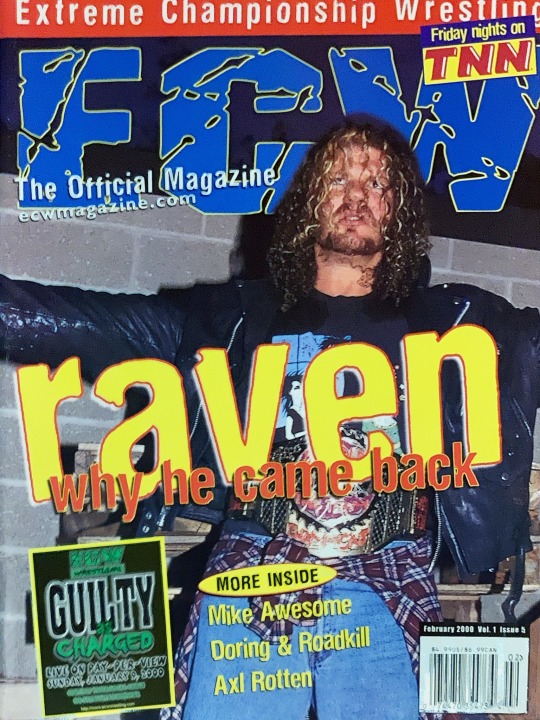

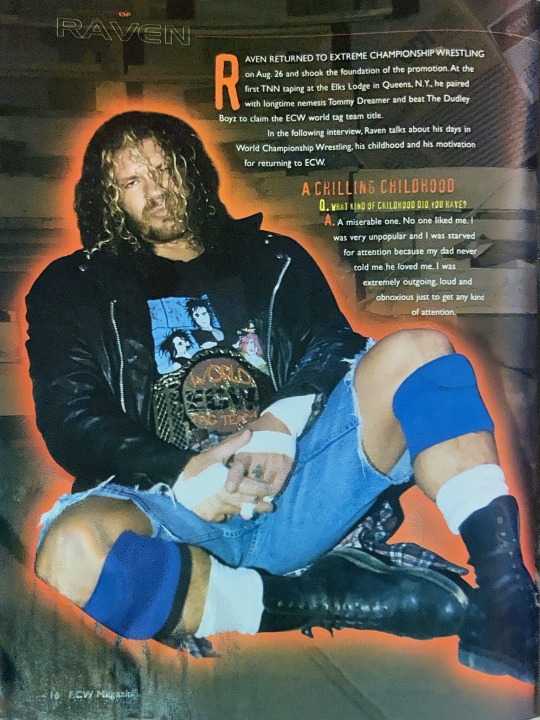
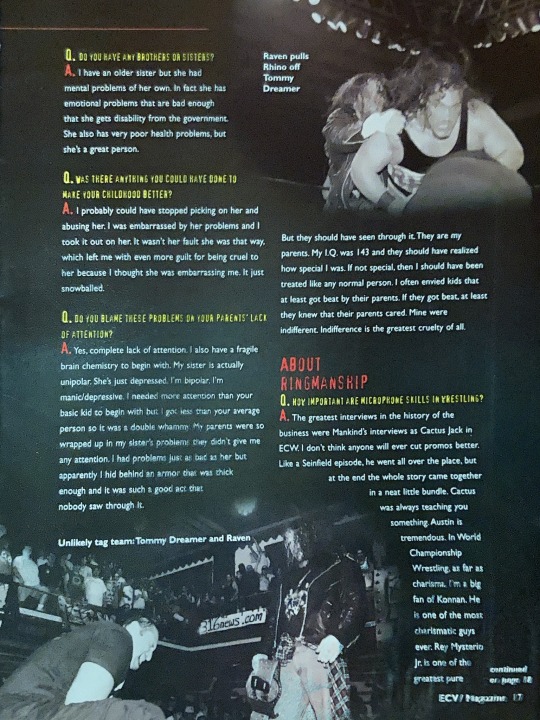
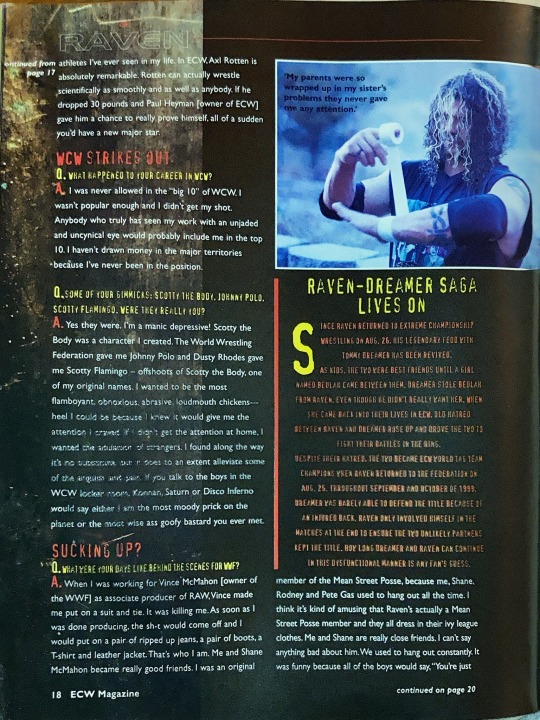
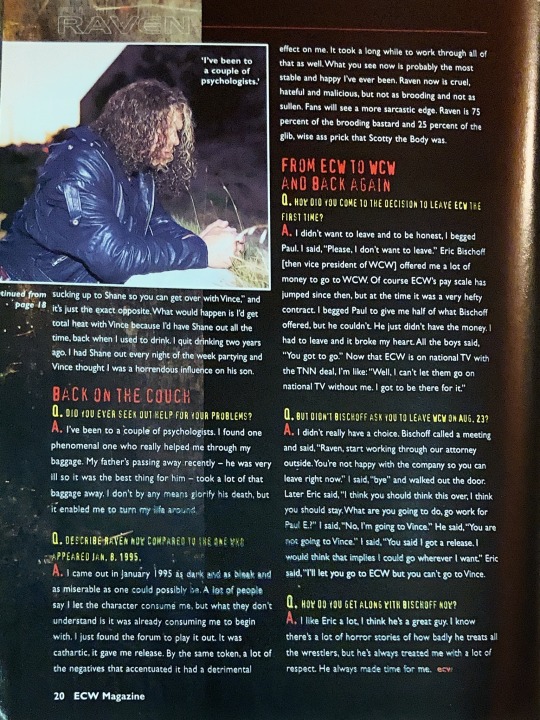
ECW Magazine: February 2000
FLIGHT OF RAVEN
Raven returns to ECW roost and brood about life
By S. Connor
RAVEN RETURNED TO EXTREME CHAMPIONSHIP WRESTLING on Aug. 26 and shook the foundation of the promotion. At the first TNN taping at Elks Lodge in Queens, N.Y., he paired with longtime nemesis Tommy Dreamer and beat The Dudley Boyz to claim the ECW world tag team title.
In the following interview, Raven talks about his days in World Championship Wrestling, his childhood and his motivation for returning to ECW.
A CHILLING CHILDHOOD
Q. WHAT KIND OF CHILDHOOD DID YOU HAVE?
A. A miserable one. No one liked me. I was very unpopular and I was staved for attention because my dad never told me he loved me. I was extremely outgoing, loud and obnoxious just to get any kind of attention.
[Raven pulls Rhino off Tommy Dreamer]
Q. DO YOU HAVE ANY BROTHERS OR SISTERS?
A. I have an older sister but she had mental problems of her own. In fact she has emotional problems that are bad enough that she gets disability from the government. She also has very poor health problems, but she’s a great person.
Q. WAS THERE ANYTHING YOU COULD HAVE DONE TO MAKE YOUR CHILDHOOD BETTER?
A. I probably could have stopped picking on her and abusing her. I was embarrassed by her problems and I took it our on her. It wasn’t her fault she was that way, which left me with even more guilt for being cruel to her because I thought she was embarrassing me. It just snowballed.
Q. DO YOU BLAME THESE PROBLEMS ON YOUR PARENTS’ LACK OF ATTENTION?
A. Yes, complete lack of attention. I also have a fragile brain chemistry to begin with. My sister is actually unipolar. She’s just depressed. I’m bipolar, I’m manic/depressive. I needed more attention than your basic kid to begin with but i got less than your average person so it was a double whammy. My parents were so wrapped up in my sister’s problems they didn’t give me any attention. I had problems just as bad as her but apparently I hid behind an armor that was thick enough and it was such a good act that nobody saw though it. But they should have seen through it. They are my parents. My I.Q. was 143 and they should have realized how special i was. If not special, then I should have been treated like any normal person. I often envied kids that at least got beat by their parents. If they got beat, at least they knew that their parents cared. Mine were indifferent. Indifference is the greatest cruelty of all.
[Unlikely tag team: Tommy Dreamer and Raven]
ABOUT RINGMANSHIP
Q. HOW IMPORTANT ARE MICROPHONE SKILLS IN WRESTLING?
A. The greatest interviews in the history of the business were Mankind’s interviews as Cactus Jack in ECW. I don’t think anyone will ever cut promos better. Like a Seinfield episode, he went all over the place, but at the end the whole story came together in a neat little bundle. Cactus was always teaching you something. Austin is tremendous. In World Championship Wrestling, as far as charisma, I’m a big fan of Kannan. He is one of the most charismatic guys ever. Rey Mysterio Jr. is one of the greatest pure athletes I’ve ever seen in my life. In ECW, Axl Rotten is absolutely remarkable. Rotten can actuallt wrestle scientifically as smoothly and as well as anybody. If he dropped 30 pounds and Paul Heyman [owner of ECW] have him a chance to really prove himself, all of a sudden you’d have a new major star.
WCW STRIKES OUT
Q. WHAT HAPPENED TO YOUR CAREER IN WCW?
A. I was never allowed in the “big 10” of WCW. I wasn’t popular enough and I didn’t get my shot. Anybody who truly has seen my work with an unjaded and uncynical eye would probably include me in the top 10. I haven’t drawn money in the major territories because I’ve never been in the position.
Q. SOME OF YOUR GIMMICKS: SCOTTY THE BODY, JOHNNY POLO, SCOTTY FLAMINGO. WERE THEY REALLY YOU?
A. Yes they were. I’m a manic depressive! Scotty the Body was a character I created. The World Wrestling Federation gave me Johnny Polo and Dusty Rhodes gave me Scotty Flamingo - offshoots of Scotty the Body, one of my original names. I wanted to be the most flamboyant, obnoxious, abrasive, loudmouth chickens—heel I could be because I knew it would give me the attention I craved. If i didn’t get the attention at home, I wanted the adulation of strangers. I found along the way it’s no substitute, but it does to an extent alleviate some of the anguish and pain. If you talk t the boys in the WCW locker room. Konnan, Saturn or Disco Inferno would say either I am the most moody pick on the planet to the most wise ass goofy bastard you ever met.
[‘My parents were so wrapped up in my sister’s problems they never have me any attention.’]
RAVEN-DREAMER SAGA LIVES ON
SINCE RAVEN RETURNED TO EXTREME CHAMPIONSHIP WRESTLING ON AUG. 26, HIS LEGENDARY FEUD WITH TOMMY DREAMER HAS BEEN REVIVED.
AS KIDS, THE TWO WERE BEST FRIENDS UNTIL A GIRL NAMED BEULAH CAME BETWEEN THEM. DREAMER STOLE BEULAH FROM RAVEN, EVEN THOUGH HE DIDN”T REALLY WANT HER. WHEN SHE CAME BACK INTO THEIR LIVES IN ECW, OLD HATRED BETWEEN RAVEN AND DREAMER ROSE UP AND DROVE THE TWO TO FIGHT THEIR BATTLES IN THE RING.
DESPITE THEIR HATRED, THE TWO BECAME ECW WORLD TAG TEAM CHAMPIONS WHEN RAVEN RETURNED TO THE FEDERATION ON AUG. 26. THROUGHOUT SEPTEMBER AND OCTOBER OF 1999, DREAMER WAS BARELY ABLE TO DEFEND THE TITLE BECAUSE OF AN INJURED BACK. RAVEN ONLY INVOLVED HIMSELF IN THE MATCHES AT THE END TO ENSURE THE TWO UNLIKELY PARTNERS KEP TTHE TITLE. HOW LONG DREAMER AND RAVEN CAN CONTINUE IN THIS DYSFUNCTIONAL MANNER IS ANY FAN’S GUESS.
SUCKING UP?
Q. WHAT WERE YOUR DAYS LIKE BEHIND THE SCENES FOR WWF?
A. When i was working for Vince McMahon [owner of the WWF] as associate producer of RAW, Vince made me put on a suit and tie. It was killing me. As soon as I was done producing, the sh-t would come off and I would put on a pair of ripped up jeans, a pair of boots, a T-shirt and leather jacket. That’s who I am. Me and Shane McMahon became really good friends. I was an original member of the Mean Street Posse, because me, Shane, Rodney and Pete Gas used to hang out all the time. I think it’s kind of amusing that Raven’s actually a Mean Street Posse member and they all dress in their ivy league clothes. Me and Shane are really close friends. I can’t say anything bad about him. We used to hang out constantly. It was funny because all of the boys would say, “You’re just sucking up to Shane so you can get over with Vince,” and it’s just the exact opposite. What would happen is I’d get total heat with Vince because I’d have Shane out all the time, back when I used to drink. I quit drinking two tyears ago. I had Shane out every night of the week partying and Vince thought I was a horrendous influence on his son.
[I’ve been to a couple psychologists.’]
BACK ON THE COUCH
Q. DID YOU EVER SEEK OUT HELP FOR YOUR PROBLEMS?
A. I’ve been to a couple psychologists. I found one phenomenal one who really helped me through my baggage. My father’s passing away recently - he was very ill so it was the best thing for him - took a lot of that baggage away. I don’t by any means glorify his death, but it enabled me to turn my life around.
Q. DESCRIBE RAVEN NOW COMPARED TO THE ONE WHO APPERED JAN. 8, 1995.
A. I came out in January 1995 as dark and as bleak and as miserable as one could possibly be. A lot of people say I left the character consume me, but what they don’t understand is it was already consuming me to begin with. I just found the forum to play it out. It was cathartic, it gave me release. By the same token, a lot of the negatives that accentuated it had a detrimental effect on me. It took a long while to work through all of that as well. What you see now is probably the most stable and happy I've ever been. Raven now is cruel, hateful and malicious, but bot as brooding and not as sullen. Fans will see a more sarcastic edge. Raven is 75 precent of the brooding bastard and 25 perfect of the glib, wise ass prick that Scotty the Body was.
FROM ECW TO WCW AND BACK AGAIN
Q. HOW DID YOU COME TO THE DECISION TO LEAVE ECW THE FIRST TIME?
A. I didn’t want to leave and to be honest, I begged Paul. I said, “Please, I don’t want to leave.” Eric Bischoff [then vice president of WCW] offered me a lot of money to go to WCW. Of course ECW’s pay scale has jumped since then, but at this time it was a very hefty contract. I begged Paul to give me half of what Bischoff offered, but he couldn’t he just didn’t have the money. I had to leave and it broke my heart. All the boys said, “You got to go.” Now that ECW is on national TV with the TNN deal, I’m like: “well, I cant let them go on national TV without me. I got to be there for it.”
Q. BUT DIDN’T BISCHOFF ASK YOU TO LEAVE WCW ON AUG. 23?
A. I didn't really have a choice. Bischoff called a meeting and said, “Raven, start working through our attorney outside. You’re not happy with the company so you can leave right now.” I said, “bye” and walked out the door. Later Eric said, “I think you should think this over, I think you should stay. What are you going to do, go work for Paul E.?” I said, ”No, I’m going to Vince.” He said, “You are not going to Vince.” I said, “You said I got a release. I would think that implies I could go wherever I want.” Eris said, “I’ll let you go to ECW but you can’t go to Vince.”
Q. HOW DO YOU GET ALONG WITH BISCHOFF NOW?
A. I like Eric a lot, I think he’s a great guy. I know there’s a lot of horror stories of how badly he treats all the wrestlers, but he’s always treated me with a lot of respect. He always made time for me.
#raven#Raven ecw#ecw#extreme championship wrestling#magazine scan#magazine transcript#this guy is so fucking gay
12 notes
·
View notes
Text
I suppose this speech started the current push against the New World Order/The West/NATO/NeoCons. Perhaps a modern “shot heard ‘round the world” for this revolution
0 notes
Text
Mearsheimer Realism
Do you have a take on the realist school of though seen from people like John Mearsheimer? Was listening to an interview he did that made some interesting points about ethics vs realism in foreign policy as well as the end of the unipolar world situation following the cold war. Boiled down to we need to concede on Ukraine and get Russia more aligned with the west to contain China, its not possible to do both and China is more of a threat. I can see the value of this kind of arguments but its very much at odds with some of the more morally informed view about the US opposing tyrants and smaller nations rights etc that you have at times expressed on the blog and I wanted to know if you had a take.
In short: it’s wrong, and despite being named “realism” is grounded in fiction.
For one, the growing Russia-China alliance was always going to happen. As Russia declined further into geopolitical irrelevance, Putin’s choice was to either fade away or attempt to force a return to the past by acting as the champion of a bloc to resurrect the old Cold War. He opted for the latter, and given Russia’s anemic GDP, its only recourse was to act as a bully on the world stage. To hope for Russian support against China is a fantasy - China and Russia’s growing closeness grows out of a desire to push other countries out of what they see as their spheres of influence. Even a Russia that was downright hostile to China would demand US withdrawal from Eastern Europe. If the point of realism is that countries govern according to their national interests, power politics, and self-preservation, then Russia is always going to seek confrontation with the United States because the US, EU, and NATO emerged as a credible and desirable alternative to the Russian sphere of influence after the collapse of the Soviet Union.
For two, Russia has used a variety of coercive measures against its neighbors for decades, attempting to export instability and maintain a stranglehold on the near-abroad. Under the Mearsheimer model, Russia started to be provoked with the 2008 increased NATO dialogues with Ukraine (and Georgia), but Russia had already been meddling in Ukraine years earlier, attempting to rig the 2004-2005 elections or enacting energy sanctions against Kyiv for not showing enough deference to Moscow throughout the 1990′s and early 2000′s. From the get-go, Russia is a perennially paranoid, hostile world actor attempting to export instability as a means to preserve its own influence as opposed to a sober, rational actor that sought to preserve its own power. So to expect them to align themselves and act as a good-faith actor is a pipe dream.
So yeah, it’s not only wrong from an idealistic perspective, but from a practical one as well. Should someone like Ramaswamy (who also argues for this) get into power, Putin will laugh, take everything they’re willing to give away, and continue turning his nation into a Chinese client-state all out of a vain desire to recreate the old Cold War where Russia mattered.
Thanks for the question, Esq.
SomethingLikeALawyer, Hand of the King
11 notes
·
View notes